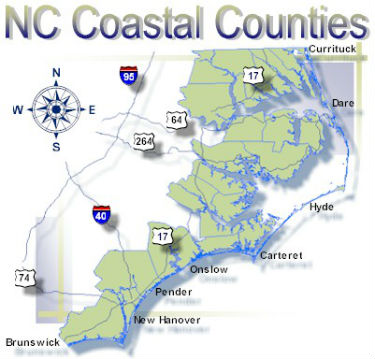RALEIGH — North Carolina’s environmental agency has warned legislators that they are putting the state’s federally approved coastal-management program in jeopardy if a bill that remakes the coastal commission becomes law.
In a memo to legislators, the N.C. Department of Environment and Natural Resources, or DENR, said the federal government would probably consider the changes to the state’s Coastal Resources Commission, or CRC, that are contained in Senate Bill 10 significant enough to require a public hearing, reviews by several federal agencies and a study of the changes’ environmental effects.
Supporter Spotlight
The federal government would likely in the end approve the changes because of the “relatively flexible nature” of federal law, the department said in the memo. “Still, this is ultimately a federal decision so there is no guarantee that S10 will not jeopardize program approval,” the memo concludes.
If the state’s coastal program fell out of federal favor, the N.C. Division of Coastal Management, the agency that administers commission rules, would lose $2.5 million a year in federal money that pays for staff and planning and the ability to enforce several types of federal permits. The state would also not be able to block federal projects or permits that are inconsistent with state rules and policies.
The bill could also lead the U.S. Environmental Protection Agency to question whether the state could adequately enforce federal environmental laws because of changes the bill also makes to the Environmental Management Commission, Robin Smith, a lawyer and former DENR assistant secretary, writes in a recent blog.
 These are the counties that come under the jurisdiction of the N.C. Coastal Resources Commission. Map: N.C. Division of Coastal Management |
The N.C. Senate passed the bill in a few days with no public comment and little debate. The state House has been more deliberate. Rep. Rick Catlin, a Republican freshman from New Hanover County, will reportedly lead a review of the bill’s possible implications for the CRC. He recently told a meeting of the League of Women Voters that he has serious questions about the bill.
“I have concerns about the loss of institutional knowledge by completely reconstituting these boards,” Catlin was quoted as saying in the Lumina News of Wrightsville Beach.
Supporter Spotlight
Todd Miller, the executive director of the N.C. Coastal Federation, has been very critical of the bill and is encouraged by the state House’s apparently more studied approach. “They’ve slowed the train down in the House,” he said. “This bill has such serious and wide-ranging implications that it at least deserves a long, hard look.”
The bill would reduce the size of the coastal commission and, more importantly, change its composition. Seats representing various coastal interests, such as agriculture, commercial and sports fishing, forestry, local government and conservation, would be eliminated or their number reduced on the reconstituted board. The number of coastal developers or landowners would double. The governor and the legislature, which would make the appointments, would also have more freedom to choose whomever they like to at-large seats, which would increase from three to five.
None of the new commission members, under the bill, would have to live on the coast, as most must now, or even in the state. The bill also does away with the restriction that a super majority of members not earn a “significant” portion of their income from activities that the commission regulates.
North Carolina is among the 34 states and territories whose coastal-management programs are approved under a 1972 federal law that provides money and assistance to states to help them better protect the coastal environment. The law requires, though, that the federal government approve any changes to the programs.
It approves most changes to state programs as “routine.” Those that are so substantial that they could alter the ability of a program to meet the mandates of the federal law are considered “amendments” to the state program and require a letter from the state justifying why the change is needed, a public hearing, a review by federal agencies and a study of the change’s potential environmental effects. Federal rules require that all this be done before “final state action” on the proposed change, and they allow grants to be suspended while the review takes place.
 Robin Smith, a former DENR assistant secretary, wonders how EPA will react to the proposed changes to the Environmental Management Commission. |
The Office of Ocean and Coastal Resource Management at the National Oceanic and Atmospheric Administration, or NOAA, administers the federal law and manages the state programs. The acting director of the program has declined to publicly comment on the bill and its implications.
But NOAA has apparently told DENR that the proposed changes to the CRC are significant. “S10 changes the membership makeup and the conflict of interest standards for the CRC,” the DENR memo to the legislature explains. “Based on preliminary consultations with NOAA, the proposed changes to the Coastal Resources Commission in S10 will likely be (DENR emphasis) considered as a ‘Program Amendment’…”
DENR’s public information office referred questions about the memo to Crystal Feldman, Gov. Pat McCrory’s press secretary. She didn’t return a phone call.
Smith, the former DENR assistant secretary, wonders in her blog how EPA will react to eliminating the income restrictions for those who serve of the Environmental Management Commission, the state’s major rule-making board.
“… Senate Bill 10 repeals language requiring that at least nine EMC members must be people who do not derive significant income from activities regulated by the commission,” she writes. “The language … exists in part to meet federal requirements for delegated permitting programs under the Clean Water Act and Clean Air Act. Complete repeal of the language may cause EPA to question North Carolina compliance with federal rules governing those delegated programs.”







